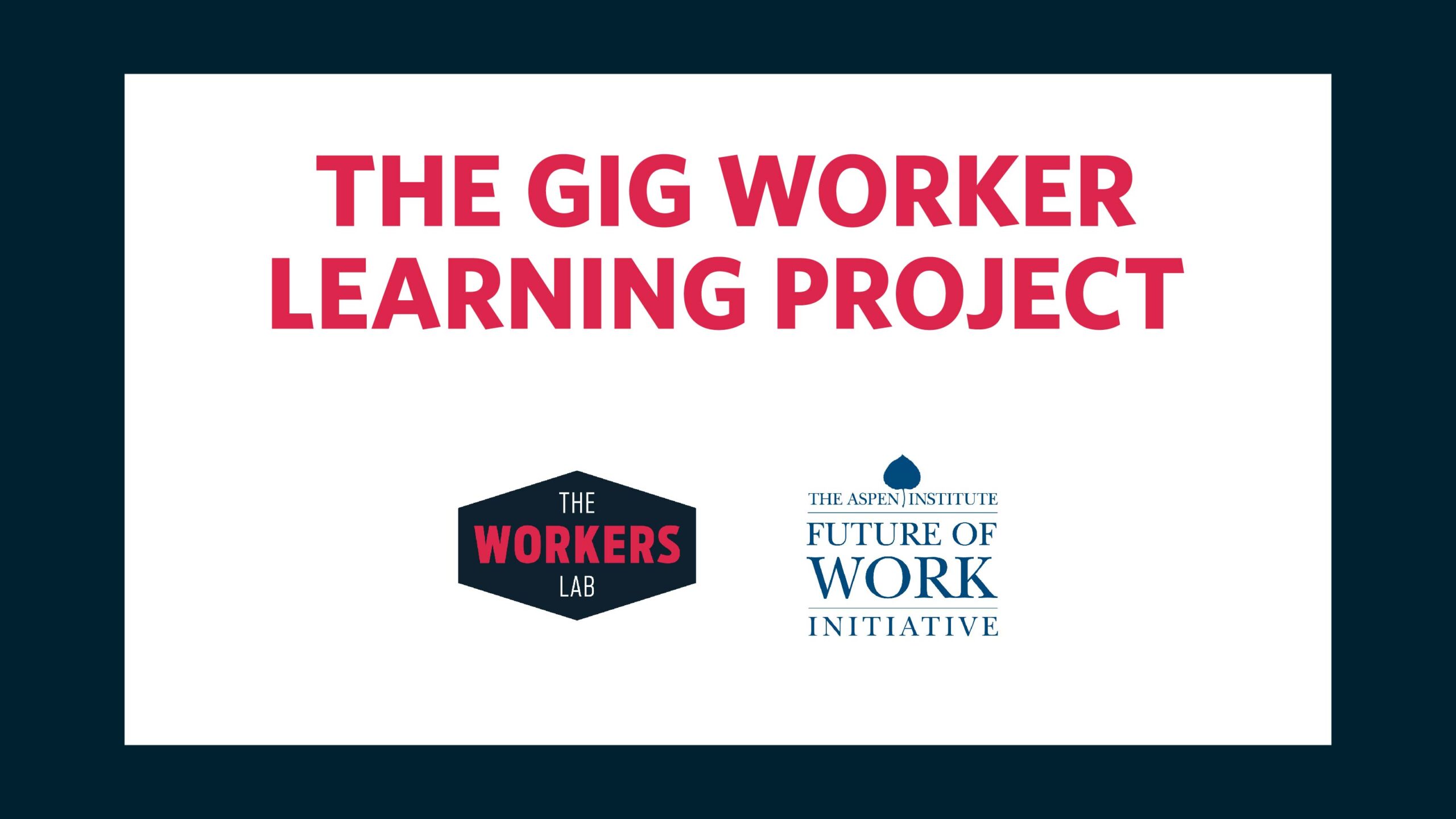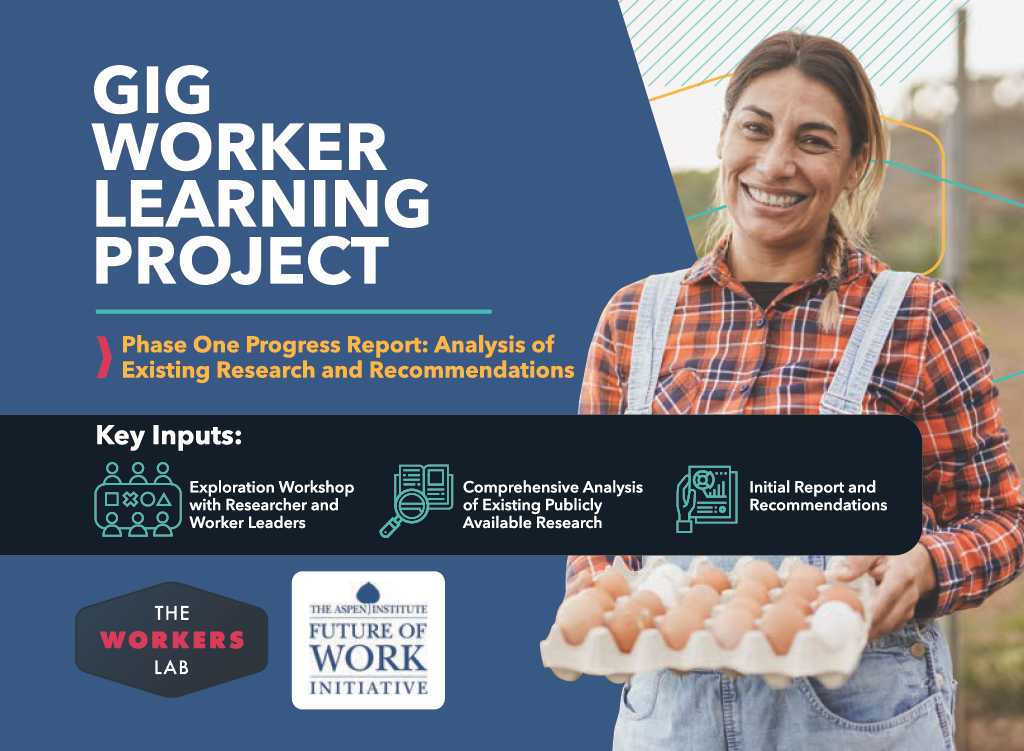NFTs, Smart Contracts, & DAOs
NFTs, Smart Contracts, & DAOs
A Resource for Creatives
A report to help creatives capture the opportunities of blockchain technologies, while protecting themselves from legal risk
When we started seeing many BIPOC artists moving into the blockchain space several years ago, we started building our own expertise in this area.
That’s why we commissioned Alex Glancy at Gundzik Gundzik Heeger LLP to author this report exploring the legal challenges artists face on the blockchain.
To support creatives as they engage with this new technology, this report seeks to provide information in the legal areas of copyright, business entities, securities, contracts, and trademark, as applied to these emerging tools.
Ultimately, we hope this report serves as a resource to help creatives capture the opportunities of blockchain technologies, while protecting themselves from the risks.
What do gig workers really want?
What do gig workers really want?
We're thrilled to support new participatory research to find out.
Althea Erickson
Althea Erickson is the Director of the Sol Center for Liberated Work, a program of the Center for Cultural Innovation. Previously, Althea was the Vice President of Global Government Affairs and Impact at Etsy, and Advocacy & Policy Director at Freelancers Union.
For several years now, the conversation about gig work and the future of work has been hampered by the lack of good data.
Current measurements of the gig workforce are notoriously inconclusive and contradictory. Existing studies rely on conflicting definitions and overlapping terms (e.g., separating out or collapsing freelancers, contract workers, independent workers, itinerant workers, gig workers, etc.) that result in findings so disparate, they undermine the data’s usefulness and credibility.
Existing research also fails to capture the full diversity of gig workers across sectors. So often, the conversation focuses on app-based workers, but fails to consider informal workers, farm workers, street vendors, arts workers, and any number of other categories of non-traditional work who ALSO lack the benefits and protections tied to full time employment.
Moreover, existing research fails to uncover what workers say they need and what solutions they want. Ultimately, such data is necessary, not only to anchor any new effort to deliver benefits and protections outside of employment, but to build the political power that gig workers need to win them.

That’s why we’re thrilled to announce Sol Center’s first grant, to support the Gig Worker Learning Project, a participatory research project by The Workers Lab and the Aspen Institute Future of Work Initiative, seeking to understand gig workers’ needs and the solutions that will impact them most. The first phase of the project, which took place over 2022, included early stakeholder outreach and a landscape scan of existing gig workers research. The second phase will rely on participatory research methodology to develop a foundational understanding of gig workers’ most pressing challenges and identify solutions that workers feel would impact them personally.
Participatory research methods differ from traditional ones by positioning research subjects as collaborators and owners of the research process and data. In this, the Gig Worker Learning Project doesn’t just start with excluded and marginalized workers; it puts them in the driver's seat of research design, data collection, dissemination, and data ownership. The team will also build a cross-sector community of leaders, researchers, and worker organizations committed to gig and contract worker-centered knowledge, who can amplify findings and collectively frame their work from the perspective of gig workers.
Finally, and perhaps most importantly, the project will build infrastructure for power building across worker groups through a Participatory Research Toolkit that equips gig worker organizations with tools to collect ongoing data on workers’ lives. This data will bolster each organization’s ability to advocate on behalf of its members with policymakers, supporting their efforts to build political power. It will also form the basis of a larger national dataset about gig work, owned by gig worker groups.
In this, the project will build the infrastructure to enable cross-sectoral collaboration around a shared agenda for gig work, one rooted not in the perspectives of powerful interest groups, but in the perspectives of workers themselves. To the extent that the project will help create more open space in the debate, it will also equip worker organizations to fill it.
We couldn’t be more excited to support this project. Learn more about the work here!
Gig Worker Learning Project: Phase One Report
Gig Worker Learning Project
Phase one progress report
The Gig Worker Learning Project is a valuable resource for anyone seeking to better understand gig workers and the challenges they face.
For several years now, the conversation about gig work and the future of work has been hampered by the lack of good data. That’s why we’re thrilled that Sol Center’s first grant supports the Gig Worker Learning Project, a participatory research project by The Workers Lab and the Aspen Institute Future of Work Initiative, seeking to understand gig workers’ needs and the solutions that will impact them most.
The first phase of the project, which took place over 2022, included early stakeholder outreach and a landscape scan of existing gig workers research. The Gig Worker Learning Project published its findings from that analysis in February 2023, and considers several questions, such as:
- What is the “Gig Economy”?
- What are gig workers doing to make money?
- Who are gig workers?
- How do digital platforms affect the experiences of gig workers?
- How are gig workers using their incomes?
- What kinds of benefits and protections exist for gig workers?
This is a valuable resource for anyone seeking to better understand gig workers and the challenges they face, and definitely worth a read!
Arts Workers in California
Arts Workers in California
Creating a more inclusive social contract to meet arts workers' and other independent contractors' needs
This report outlines the working arrangements of California’s arts workers and sheds new light on the challenges and issues they face, particularly when working as independent contractors.
The Center for Cultural Innovation, with support from the William and Flora Hewlett Foundation, commissioned the Arts Workers in California report to help arts advocates, labor advocates, and policy makers create more inclusive systems that expand protections and benefits for all types of workers.
The report outlines the working arrangements of California’s arts workers and sheds new light on the challenges and issues they face, particularly when working as independent contractors. It also identifies policy shifts to update systems, for those in California or nationally, that could be more inclusive of artists and those who similarly operate outside the traditional bounds of employment. Such protections include collective bargaining power for all types of workers, access to health insurance, family leave, anti-discrimination, and savings toward retirement.
In many ways, this report is the founding document that underpins Sol Center’s work. It’s worth a read!
Survival Economies: Black Informality in Chicago
Survival Economies
Black informality in Chicago
Nik Theodore, University of Illinois at Chicago. Forward by Richard Wallace, Equity and Transformation
Nik Theodore is a Professor in the University of Illinois at Chicago (UIC)’s Department of Urban Planning and Policy. His work focuses on economic restructuring, labor standards, and worker organizing. Richard Wallace is the founder and director of Equity and Transformation (EAT), an organization which fights for social and economic equity for Black workers in informal work and those who have been formerly incarcerated.
EAT was founded in 2018 by post-incarcerated Black people from Chicago, in an effort to uplift the voices and power of Black informal workers in the US. The mission of EAT is to build social and economic equity for Black workers engaged in the informal economy.
Survival Economies is an important report that explores the ways many Black informal workers in Chicago get by from day to day. Excluded from the benefits and protections of traditional employment, they rely on informal activities, like selling loose cigarettes or offering informal childcare, for income.
Expanding protections for all requires finding solutions that will work for those who are most excluded from the current safety net, like the Black, informal workers who make up the membership of Equity and Transformation (EAT) Chicago, whose work and lives are documented in this report.
EAT was founded in 2018 by post-incarcerated Black people from Chicago, in an effort to uplift the voices and power of Black informal workers in the US. The mission of EAT is to build social and economic equity for Black workers engaged in the informal economy.
Learn more about EAT Chicago’s important work here.



